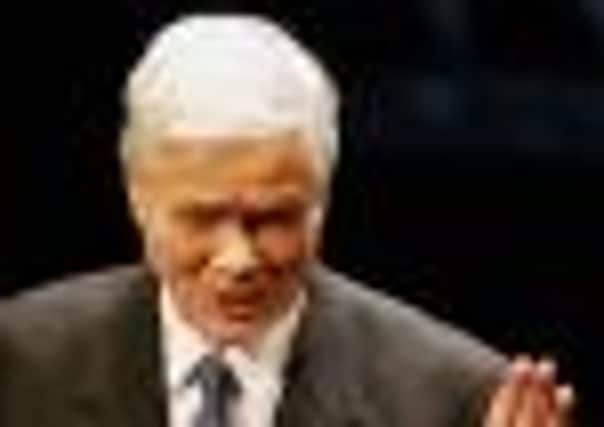Obituary: Dietrich Fischer-Dieskau, legendary singer delighted Festival crowds for more than 30 years


His command of a concert platform was legendary but Dietrich Fischer-Dieskau had a vocal control and an exceptional delivery that made him unquestionably the greatest lieder singer of the post-war era.
The German baritone was supreme in the songs of Schubert and was blessed with a voice of exceptional beauty and a dedication to his art that ensured a Fischer-Dieskau concert was always a masterclass. There was never stress in his voice and his technique was flawless.
Advertisement
Hide AdAdvertisement
Hide AdScotland was fortunate to hear Fischer-Dieskau right from the start of his career and he regularly returned for more than 30 years. He first came to the Edinburgh Festival in 1952 to sing in the Freemasons’ Hall Schubert’s Die Winterreise. He was then involved in a Festival drama when a new work was not ready and the conductor Sir John Barbirolli asked him to save the concert and sing a Brahms song cycle.
This spontaneous action by the baritone endeared him to the Scottish public and he was to return on 15 occasions to the Festival. To all those concerts he brought an intelligence and musicality that marked his appearances as special events.
His partnership with the pianist and conductor, Daniel Barenboim, was born in Edinburgh and their mutual understanding of the music led to historic concerts in the Usher Hall in the 1970s. Then at the end of the decade, Peter Diamand, the Festival director, mounted a special production of Mozart’s Marriage of Figaro, with a stellar cast directed by Peter Ustinov and conducted by Barenboim. Fischer-Deskau’s elegant and beautifully sung Count made a strong impression.
Of equal importance was the historic appearance in the Usher Hall, in 1968, with the original Coventry soloists for Benjamin Britten’s War Requiem. It was conducted by Carlo Maria Guilini, and the composer considered the performance the best he had heard. His final appearances at the Festival were in 1978 and 1984. At the former, Fischer-Dieskau joined Guilini for a memorable performance of Brahms’ German Requiem and later that week joined a line-up of stars in a midnight gala in the Usher Hall to bid farewell to Diamand. In 1984, Fischer-Dieskau and his wife Julia Varady gave a powerful reading of Bartok’s Duke Bluebeard’s Castle.
Albert Dietrich Fischer-Dieskau’s father was an academic and he grew up amidst the rise of Nazism. It affected him deeply as his disabled brother was starved to death under the euthanasia programme. Fischer-Dieskau served in the army and was captured in Italy. In 1947, he gave his first solo recital. His operatic debut was the following year and he first appeared in London in 1951, singing Delius’s A Mass of Life under Sir Thomas Beecham.
His concert work was the centre of Fischer-Dieskau’s career but he enjoyed a considerable career in the opera house, becoming closely associated with the title roles of Verdi’s Falstaff and Berg’s Wozzeck.
At the Salzburg Festival in 1959, he began a close association with the conductor Wilhelm Fürtwangler and recorded a much praised version of Wagner’s Tristan und Isolde. The operatic role which he made very much his own was Mandryka in Richard Strauss’ Arabella. He sang it throughout Europe and on an all too rare visit to Covent Garden
After the success of the War Requiem in Edinburgh, Britten dedicated one of his most emotional song cycles – Songs and Proverbs of William Blake – to Fischer-Dieskau. Fischer-Dieskau did much to encourage new music, especially by Hans Werner Henze (Fischer-Dieskau created the role of Gregor in Henze’s Elegy for Young Lover) and the equally challenging title role in Reimann’s Lear in 1978.
Advertisement
Hide AdAdvertisement
Hide AdHis extensive recordings include the songs of Schubert, Wolf and Schumann. He recorded Die Winterreisse six times and was also a fine exponent of sacred music – especially Bach.
It was the definitive rendering of Schubert’s lieder that made Fischer-Dieskau such a consummate artist. Every note was meticulously prepared and rehearsed yet his natural musicality shone through. But Fischer-Dieskau remained a practical artist. He sang the role of Gunter in the famous Solti recording of the Wagner Ring cycle in the 1960s. He was asked by a BBC reporter how he saw the role and the entire Ring cycle. “It is simply,” the baritone candidly replied, “a family disaster.”
The pianist Gerald Moore, with whom he often worked, wrote: “Dietrich lives music, thinks music, talks music.” The tenor Ian Bostridge, a fine contemporary lieder singer, recalled: “Fischer-Dieskau was a titanic figure and a mirror of his age.
“His performance in the War Requiem called to mind the circumstances of its premiere in Coventry when he struggled with his memories at the end of the piece, barely able to move.”
Fischer-Dieskau married four times. He is survived by Julia Varady, and three sons of his first marriage.
Alasdair Steven